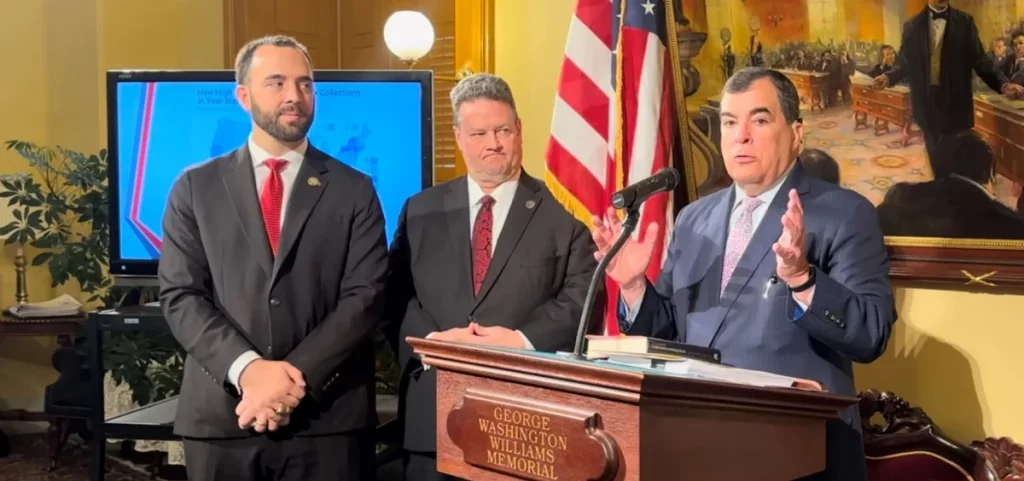COLUMBUS, Ohio (Statehouse News Bureau) — Republican state lawmakers are once again proposing eliminating the state income tax. And this plan also would erase the state’s main business tax, the commercial activity tax.
It would be phased in but based on current numbers, eliminating both those taxes would cost the state $13 billion. That’s about 15% of its overall revenue in the 2024 fiscal year.
The House version would eliminate the personal income tax by 2028. The Senate version eliminates it two years earlier. And the plan would also erase the commercial activity tax, or CAT, for the 10% of businesses still paying it. An estimated 90% of Ohio businesses no longer pay the CAT after a cut in the current budget.
Supporters of the idea said the state’s economic engine was strong until the state income tax was instituted by a Democratic governor and a Republican legislature in 1971. Per capita income in Ohio decreased after a national recession in 1969 and another in 1974, and the state lost around 700,000 well-paying manufacturing jobs between 1970 and 2015, according to a study from Ohio State University in 2017. Ohio had 24 members of Congress in the early 1970s.
The idea’s backers said the state’s economy has improved since Republican former Gov. John Kasich started eliminating income tax brackets and lowering the tax rate when he took office in 2010.
“We’ve had actually an increase of revenue because when you have more economic activity coming into the state or staying in the state and growing here, whether that’s sales tax or income tax, you have an increase of revenue. And we’ve seen sales tax continue to increase and keeping at a consistent rate,” Rep. Adam Mathews (R-Lebanon), the sponsor of the House bill, said in an interview for “The State of Ohio”.
Under Kasich, majority Republican lawmakers cut state income taxes but raised state sales taxes as part of a shift away from reliance on the income tax. And Ohio hit its current congressional delegation total of 15 in 2021, the smallest it’s been since 1833.

Erasing state income tax has been proposed before
Mathews said the idea to eliminate the income tax came from conversations about House Bill 1, his proposal to create a 2.75% flat income tax. That bill was a priority for Speaker Jason Stephens (R-Kitts Hill), but it hasn’t moved since April. In 2022, Sen. Steve Huffman (R-Tipp City) introduced a bill to eliminate the state income tax over ten years. It never got out of committee.
But the sponsors said this proposal is different.
“When we are successful, we have a very specific measure, a bill objective that I want everybody in this room to hold us accountable to,” said Sen. George Lang (R-West Chester) is a sponsor of the Senate version. He predicted if these taxes are cut, Ohio’s economy will grow from $750 billion to $1 trillion by 2030, and population growth will mean 16 members of Congress from Ohio, up from 15 now.
“Sports betting is now legal in Ohio. I encourage everybody bet the over on picking up a congressman,” Lang said. “And if there’s a money line on getting to get on that because I don’t think we may not stop at one, we may add two.”
Cuts might have to be made if the proposal goes through
The sponsors don’t say how they’d achieve the spending cuts that would likely be necessary, other than that Medicaid won’t be in that mix. But Lang said low-income people won’t bear the burden, since people with incomes under $26,050 don’t pay income tax now.
“This will not be a burden on those people today that are lower income earners,” Lang said. “But it will be a blessing to those people that are the ones that are driving our economy.”
The Ohio Department of Taxation reports in 2021 just over two million Ohioans, or around 38% of the population, earned too little money to pay the state income tax.
Kansas eliminated its personal income tax in 2012, but mounting budget deficits led Republicans in that state to bring back the tax five years later. Mathews said they’re looking at North Carolina as a responsible model to work from.
And Lang added: “Kansas doesn’t have the benefit that we have our natural gas resources. So just imagine if we can unleash that.”
Ohio would be the tenth state with no income tax, joining Alaska, Florida, Nevada, New Hampshire, South Dakota, Tennessee, Texas, Washington and Wyoming.
The sponsors plan to hold town hall events around the state about their proposal.

